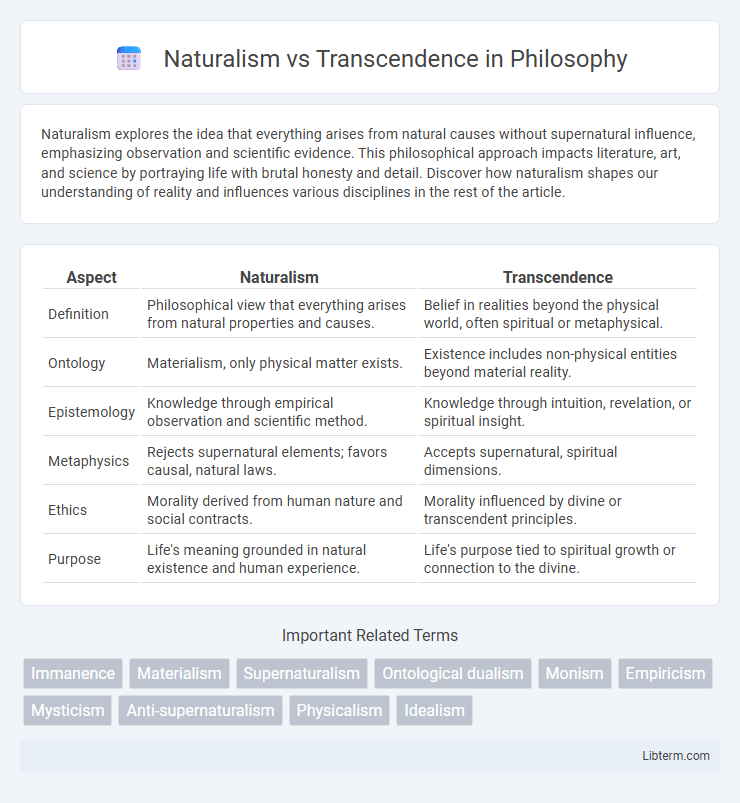Naturalism explores the idea that everything arises from natural causes without supernatural influence, emphasizing observation and scientific evidence. This philosophical approach impacts literature, art, and science by portraying life with brutal honesty and detail. Discover how naturalism shapes our understanding of reality and influences various disciplines in the rest of the article.
Table of Comparison
| Aspect | Naturalism | Transcendence |
|---|---|---|
| Definition | Philosophical view that everything arises from natural properties and causes. | Belief in realities beyond the physical world, often spiritual or metaphysical. |
| Ontology | Materialism, only physical matter exists. | Existence includes non-physical entities beyond material reality. |
| Epistemology | Knowledge through empirical observation and scientific method. | Knowledge through intuition, revelation, or spiritual insight. |
| Metaphysics | Rejects supernatural elements; favors causal, natural laws. | Accepts supernatural, spiritual dimensions. |
| Ethics | Morality derived from human nature and social contracts. | Morality influenced by divine or transcendent principles. |
| Purpose | Life's meaning grounded in natural existence and human experience. | Life's purpose tied to spiritual growth or connection to the divine. |
Introduction to Naturalism and Transcendence
Naturalism asserts that reality is solely composed of natural elements and phenomena, emphasizing empirical observation and scientific explanation. Transcendence refers to experiences or realities beyond the physical world, often linked to spirituality, metaphysics, or higher states of consciousness. The fundamental distinction lies in Naturalism's reliance on tangible evidence, while Transcendence explores dimensions that surpass ordinary sensory experience.
Defining Naturalism: Philosophy and Principles
Naturalism is a philosophical viewpoint asserting that everything arises from natural properties and causes, excluding supernatural or spiritual explanations. It emphasizes empirical evidence, scientific methods, and the laws of nature as the foundation for understanding reality. Core principles of naturalism include ontological naturalism, which denies any non-natural entities, and methodological naturalism, which guides scientific inquiry to rely solely on natural causes.
Understanding Transcendence: Beyond the Physical Realm
Transcendence refers to experiences or realities that exist beyond the empirical, physical world studied by naturalism, often involving spiritual or metaphysical dimensions. Understanding transcendence involves exploring states of consciousness, mystical experiences, and the notion of a reality that surpasses material existence. This concept challenges naturalism by positing that not all phenomena can be fully explained through physical laws and sensory perception.
Historical Roots of Naturalism and Transcendence
Naturalism traces its historical roots to the Enlightenment era, emphasizing scientific empiricism and the rejection of supernatural explanations, with key figures like David Hume and Baruch Spinoza advocating for a worldview grounded in observable nature. Transcendence, rooted in religious and philosophical traditions such as Platonism and various Eastern philosophies, centers on experiences or realities beyond the physical world, championed by thinkers like Immanuel Kant and Soren Kierkegaard who explored the limitations of human reason and the existence of metaphysical realms. These divergent historical foundations highlight the fundamental contrast between Naturalism's dedication to material reality and Transcendence's focus on metaphysical or spiritual dimensions.
Key Differences between Naturalism and Transcendence
Naturalism asserts that reality is entirely governed by natural laws and phenomena, excluding supernatural or spiritual explanations, while Transcendence posits that there are realities beyond sensory experience and material existence. Naturalism emphasizes empirical evidence and scientific methods as the sole sources of knowledge, whereas Transcendence embraces metaphysical concepts and spiritual insights that lie beyond empirical verification. The key difference lies in Naturalism's reliance on observable, physical reality versus Transcendence's belief in an existence that surpasses natural laws and human perception.
Naturalism in Science and Modern Thought
Naturalism in science emphasizes empirical evidence and the understanding of natural laws as the foundation of reality, rejecting supernatural explanations. Modern thought adopts this framework to promote a methodology grounded in observation, experiment, and reason, facilitating technological progress and theoretical advancements. This approach underpins disciplines such as physics and biology, reinforcing a worldview where phenomena are explained through natural causes and processes.
Transcendence in Religion and Spirituality
Transcendence in religion and spirituality refers to the existence or experience beyond the physical realm, often associated with a higher power or ultimate reality that surpasses human understanding. This concept is central to many faith traditions, emphasizing the soul's connection to the divine, the afterlife, or an eternal truth that transcends material existence. Practices such as meditation, prayer, and rituals aim to foster this transcendent experience, highlighting a fundamental difference from naturalism's focus on empirical and observable phenomena.
Philosophical Debates: Strengths and Critiques
Naturalism emphasizes empirical evidence and scientific methods, asserting that everything arises from natural properties and causes, which strengthens its foundation in observable reality. Transcendence challenges this by positing realities beyond physical experience, often invoking metaphysical or spiritual dimensions that naturalism cannot address. Critics of naturalism argue it dismisses subjective experiences and values, while critiques of transcendence highlight its reliance on unverifiable assumptions and lack of empirical support.
Influence on Ethics, Morality, and Worldview
Naturalism grounds ethics and morality in empirical observation and human experience, emphasizing material causes and evolutionary biology to shape moral behavior and social norms. Transcendence introduces metaphysical dimensions, positing moral values and ethical principles as deriving from a higher reality or divine source beyond empirical evidence. This contrast influences worldview by framing morality either as a product of natural processes or as anchored in transcendent truths, shaping perspectives on meaning, purpose, and human responsibility.
Conclusion: Reconciling or Diverging Paths
Naturalism and transcendence offer contrasting worldviews, with naturalism emphasizing empirical evidence and material reality, while transcendence centers on spiritual or metaphysical dimensions beyond sensory experience. Reconciling these perspectives requires acknowledging the limits of scientific inquiry alongside the human search for meaning and purpose that transcends physical explanation. The divergence persists as naturalism prioritizes observable phenomena, whereas transcendence invokes faith and existential reflection, highlighting a fundamental philosophical divide.
Naturalism Infographic

 libterm.com
libterm.com